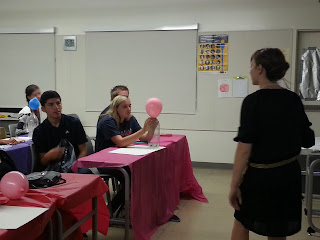(1) What is your essential question? What is the best answer to your question and why?
What is the best way for a chemistry teacher to assess the scientific understanding of their class?
My best answer is assessing students on their lab reports because it gives student's a real world application outlet on every day chemistry from the book The Chemistry Classroom: Formulas for Successful Teaching by J. Dudley. It also incorporates my other two answers, requiring students to use the scientific language in papers and oral presentations and using test scores to analyze their understanding of the class.
(2) What process did you take to arrive at this answer?
I discovered this answer by reading The Chemistry Classroom: Formulas for Successful Teaching J. Dudley as well as an article "The Challenge of Effective Teaching of Chemistry: A Case Study" by Lawrence Edomwonyi-otu and Abraham Avaa. It didn't become real until I actually needed to find a second independent component. After receiving a generous offer from Cal Poly to attend their school, I realized I can take a class that would count for next year as well. I went everyday during spring break to find a class, but it was nearly impossible to find a laboratory. I got into a lecture, but my corequisite wasn't fulfilled because labs will only accept a maximum of 24 people. In college, labs are considered their own course though. They are given a grade separate from the lecture. Labs are considered so important that they are given their own three hour class.
(3) What problems did you face? How did you resolve them?
I found it extremely difficult to find a mentor. During the summer and at the beginning of the year, I called several major local schools like Ontario High School, Diamond Bar High School, Chino Hills High School, Ayala High School, and Don Lugo High School, going through their principals, who all said no. I also contacted my uncle who works at Walnut High School if he could let me help out in a chemistry class, and he led me to the assistant principal, Bill Diskin, who explained that for me to get into a chemistry room for that long would be impossible because the school would be liable for any injuries or accidents in the lab. He was explaining that most high schools are closed campuses to ensure the safety of the school they try not to permit any high school students into dangerous classrooms that don't attend the school. I was stumped, but I continued to call. I went to my old school, Southlands Christian Schools, but they just hired a new teacher that year. "It would be hard for her," they explained, "To have to deal with a new class and a student teacher." My grandfather was talking to me about my cousins recent success at graduating from high school, and that his favorite class was, in fact chemistry. He was a home school student, and his teacher worked from a school. He was also friends with the teachers son so when I called, he was more than willing to let me sit in his class. He only had a class of 9 though so there wasn't much that I could do besides observe and help when students needed help, which was quite frequent during labs.
(4) What are the two most significant sources you used to answer your essential question and why?
My most important sources is the book that I mentioned before, The Chemistry Classroom: Formulas for Successful Teaching J. Dudley because it is an amazing resource from the Cal Poly library that gives detailed accounts of actual award winning teachers of how they graded their students and specific concepts of how they taught. My second source is my teacher at Cal Poly Pomona, Ms. Optowosky. She is an amazing teacher because she is so enthusiastic about teaching. When I interviewed her she helped me by giving me extra resources and really good advice of how to teach my future class. I just think she is a really good role model. She gave me the perspective of a chemistry teacher and a student because I haven't been a chemistry teacher since last year in Pang's.
(5) What is your product and why?
My product is that I got to teach a two hour class for my mentorship. It was such a great opportunity because I had to speak for two hours about chemistry (which most people get bored of). Seriously though, I had to make my own lesson plan and teach myself some of the concepts in a new way to teach the students. I had to think of "innovative" ways to get my points across, and I had to get used to student's just staring at me for two hours. I was extremely nervous, but it all worked out. The students afterwards came up and actually thanked me which felt really nice, and they said they really understood what I was saying. I was so happy when I finished because I got a new appreciation for teachers and I know that I want to do this in my future. My product though is that I was able to teach a chemistry class. I think my research mainly helped me think of better ways to teach a class. I based a lot of my lesson on the book Making Chemistry Relevant by Sharmistha Basu-Dutt.











































